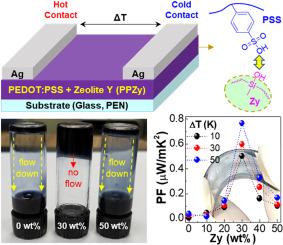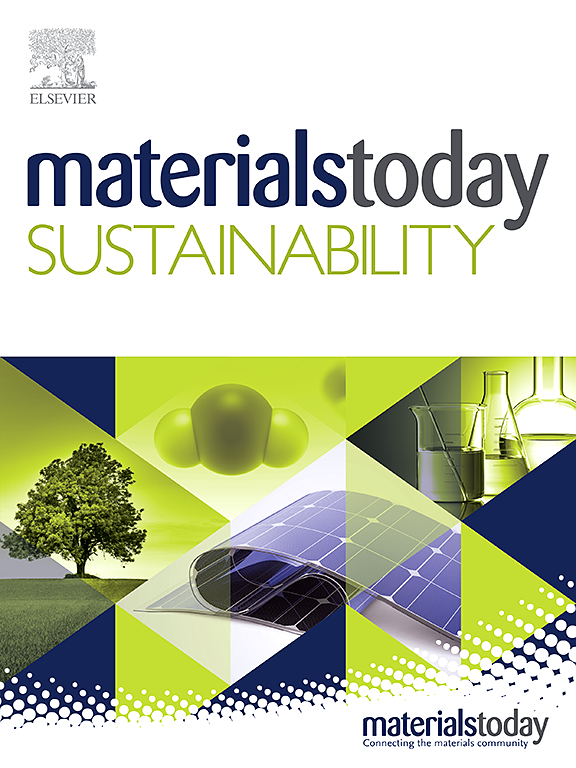利用聚合物/沸石混合复合薄膜将热能转化为电能的热电设备
IF 7.1
3区 材料科学
Q1 GREEN & SUSTAINABLE SCIENCE & TECHNOLOGY
引用次数: 0
摘要
在此,我们报告了由聚(3,4-亚乙二氧基噻吩):聚(苯乙烯磺酸)(PEDOT:PSS)和沸石 Y(Zy)组成的有机/无机混合复合薄膜可以在水平器件几何形状中有效地将热能转化为电能。PEDOT:PSS/Zy (PPZy) 混合复合薄膜是用不同 Zy 含量(最高达 50 wt%)的相应水溶液制备的。PPZy 溶液的粘度在 Zy = 30 wt% 时达到最大值,表明 PEDOT:PSS 和 Zy 成分之间存在很强的相互作用。与使用原始 PEDOT:PSS 薄膜的器件相比,使用 PPZy 复合薄膜的所有器件都能将热量转化为电能,并显示出更高的热电(TE)性能。使用 PPZy 薄膜(Zy = 30 wt%)的 TE 器件输出功率为 8.8 pW,功率因数为 0.76 μW/mK2,比使用原始 PEDOT:PSS 薄膜的器件高出约 20 倍。在聚(萘乙酸乙二醇酯)(PEN)薄膜基底上制作的柔性 TE 器件即使在经过 5000 次弯曲循环后仍能表现出稳定的 TE 性能。目前基于沸石颗粒的混合复合薄膜方法可能有助于进一步提高柔性和可穿戴 TE 器件的 TE 性能。本文章由计算机程序翻译,如有差异,请以英文原文为准。

Thermoelectric devices with polymer/zeolite hybrid composite films for conversion of heat to electricity
Here we report that organic/inorganic hybrid composite films, consisting of poly(3,4-ethylenedioxythiophene):poly(styrene sulfonate) (PEDOT:PSS) and zeolite Y (Zy), can efficiently convert heat to electricity in the horizontal device geometry. The PEDOT:PSS/Zy (PPZy) hybrid composite films were prepared from corresponding aqueous solutions at various Zy contents (up to 50 wt%). The PPZy solutions exhibited an increased viscous state with a maximum at Zy = 30 wt%, indicating strong interactions between PEDOT:PSS and Zy components. All devices with the PPZy composite films could convert heat to electricity and showed higher thermoelectric (TE) performances than those with the pristine PEDOT:PSS films. The TE devices with the PPZy films (Zy = 30 wt%) delivered an output power of 8.8 pW with a power factor of 0.76 μW/mK2, which is ca. 20 times higher than those with the pristine PEDOT:PSS films. The flexible TE devices, which were fabricated on poly(ethylene naphthalate) (PEN) film substrates, exhibited robust TE performances even after 5000 bending cycles. The present approach of hybrid composite films based on zeolite particles may contribute to further TE performance improvement for flexible and wearable TE devices.
求助全文
通过发布文献求助,成功后即可免费获取论文全文。
去求助
来源期刊

Materials Today Sustainability
Multiple-
CiteScore
5.80
自引率
6.40%
发文量
174
审稿时长
32 days
期刊介绍:
Materials Today Sustainability is a multi-disciplinary journal covering all aspects of sustainability through materials science.
With a rapidly increasing population with growing demands, materials science has emerged as a critical discipline toward protecting of the environment and ensuring the long term survival of future generations.
 求助内容:
求助内容: 应助结果提醒方式:
应助结果提醒方式:


